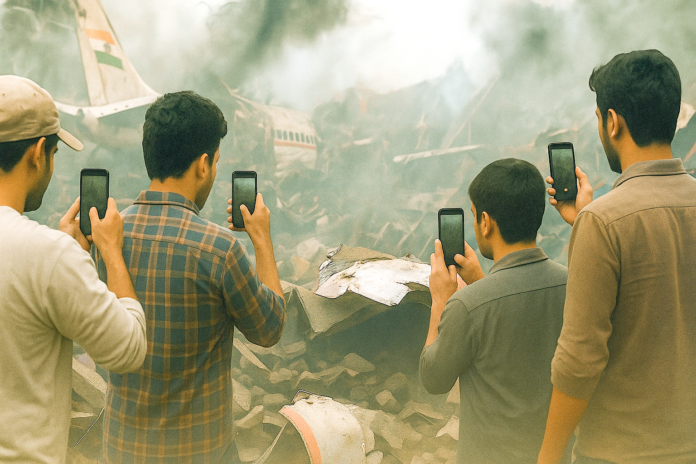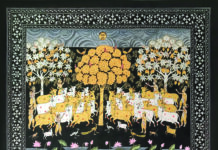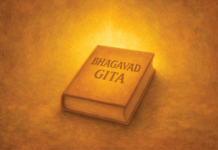Popular culture urges us to ‘live in the moment.’ But what does that really mean? Often, it becomes a license to indulge. But indulgence leads only to more craving, and more confusion.
Life unfolds beyond our control. We don’t choose our gender, birthplace, or time of arrival. The belief that we control everything is comforting, but false. A tragic accident, where many lives were lost, reminds us of this. What we really have is the opportunity to act rightly and clearly in each moment.
As Shri Krishna says in the Gita, gunāh guneṣu vartante—the gunas (modes of nature) act upon the gunas; personal doership is imagined. Real freedom begins not with control but with clarity.
This does not imply inaction or fatalism. It means living without delusion. We act not from fear, habit, or ego, but from what the situation actually requires. Action must be rooted in responsibility, not the need for comfort.
The Real Meaning of Attentive Living
Popular culture urges us to “live in the moment.” But what does that really mean? Often, it becomes a license to indulge. But indulgence leads only to more craving, and more confusion.
To be attentive is not to escape into pleasure; it is to remain grounded in fact. It is to see clearly what is happening within and around us. An attentive life is not one of constant stimulation, but of honesty. It isn’t glamorous, but it is restored sanity.
We must stop mistaking impulse for authenticity. An attentive life naturally brings with it responsibility and sobriety—not as restraint, but as a reflection of clarity.”
Drowning in Information, Losing Discernment
We check quality before buying something in the market. But online, we accept and forward whatever catches our eye. Conspiracies, half-baked numerology, even false plane crash footages flood our screens. Such reactions do not honour the victims of these tragedies; they serve only our addiction to stimulation.
Algorithms reward noise, not truth. But truth is often silent. Discernment is not a trend; it’s freedom from influence. What you mentally consume shapes what you become. If your thinking is not your own, it is someone else’s tool.
This is about more than one plane crash. It’s about what our daily habits reveal, how we turn even tragedy into content. We scroll, share, react, and remain untouched. That is the real loss.
Learning from the Tragedy, Not Escaping It
A tragedy like a plane crash should shake us into reflection. It raises urgent questions, not only about aviation but about how we build our cities, how we weigh safety against convenience, and how deeply we ignore the obvious.
Heat reduces air density, reducing lift. Urban development near airports brings birds closer to runways. Planes carry their heaviest fuel loads during takeoff, the riskiest phase. Yet we build hospitals and homes right along airport walls.
The Ahmedabad aircraft didn’t explode mid-air. It tried to land somewhere, but crashed into a densely packed settlement. Had there been open ground, many lives could have been saved. Some countries prepare for such contingencies. Here, we normalize encroachment and overlook the consequences until it is too late.
This is not just about one crash. It’s about a deeper pattern—how we normalise dysfunction, ignore known risks, and act surprised when disaster arrives.
What the City Tells Us About Ourselves
Hospitals and homes next to airports are not just planning errors; they reflect a deeper ethical failure—a refusal to prioritize sanity over profit.. Aircraft noise reaches up to 120 decibels, enough to damage hearing, disturb patients, and unsettle children. Still, we keep building closer and closer to the airport.
Overpopulation reduces discretion. Corruption approves the unthinkable. Guidelines exist, but they gather dust. What kind of system allows schools, ICU wards, and old-age homes within crash zones?
We see jets screaming overhead and call it normal. We celebrate “resilience,” when often it is just learned helplessness. The city reflects its people. And when the city becomes hostile to sanity, the people quietly suffer in its shadow.
No society can progress that forgets restraint—spatial, ecological or psychological. We cram more into less, until life itself becomes fragile, frayed, and chaotic.
Real Reform Begins Within
Whether in aviation, healthcare, or governance, every visible failure has one hidden cause: absence of clarity. We keep patching symptoms without looking at the disease.
We blame individuals—pilots, engineers, traffic controllers—without asking what sort of institutions train or pressure them. We talk of reforms without asking: what kind of mind built this system? And what kind of mind will change it?
What India needs is not more slogans, but more seriousness. Not more outrage, but more self-examination. Schools that teach thinking, not just syllabus. Leaders who can question, not just promise. Citizens who can pause, not just react.
You either live with clarity, or you live in confusion. One way leads to harmony; the other, to disorder. The consequences are not accidental, they follow a rule. When there is inner clarity, the outer world reflects stability. When clarity is absent, collapse is inevitable.
The Real Mirror: Facing Ourselves
When the crash occurred, many didn’t rush to help; they rushed to record. That tells us where the real crisis lies, not in the sky but in the mind. The phone camera has replaced the helping hand.
When grief becomes content, and pain becomes a reel, what does it say about us? When we cannot sit with loss, we turn it into a performance. That response is not natural; it reflects desensitization. A symptom of inner deadness.
To move past this deadness, we must ask: What drives our behaviour? What are we chasing when we click and post, even amid suffering? Until we understand these, we will keep repeating the same patterns with newer hashtags.
Let the Fear of Death Awaken You
To fear death is human. But to live as though we are immortal, that is delusion. We collect possessions, build insurances, and chase distractions as if time won’t find us. But time never forgets.
A life lived attentively leaves little regret. The real question is not when death will arrive, but how we are living today. To light candles for the dead means little if we keep walking blindly.
Ask: If I were in that plane, would I have lived with honesty? Would I have cared more for what matters, and less for what impresses? Would I have given my time to what is real, not what is loud? These questions are enough to begin change.
Let this not be another passing story. Let this be the crack through which responsibility enters — not out of fear but out of understanding. Because life, when looked at honestly, demands more than habit — it asks for sincerity.
(Acharya Prashant, a Vedanta exegete and philosopher, is an author, columnist, and founder of the PrashantAdvait Foundation. He is a recipient of Most Influential Vegan Award by PETA, the OCND Award from the IIT Delhi Alumni Association, and the Most Impactful Environmentalist Award by the Green Society of India)








